Spotlight on Adrienne Grunwald
Dec 10, 2011
This spotlight originally posted 12/10/2011
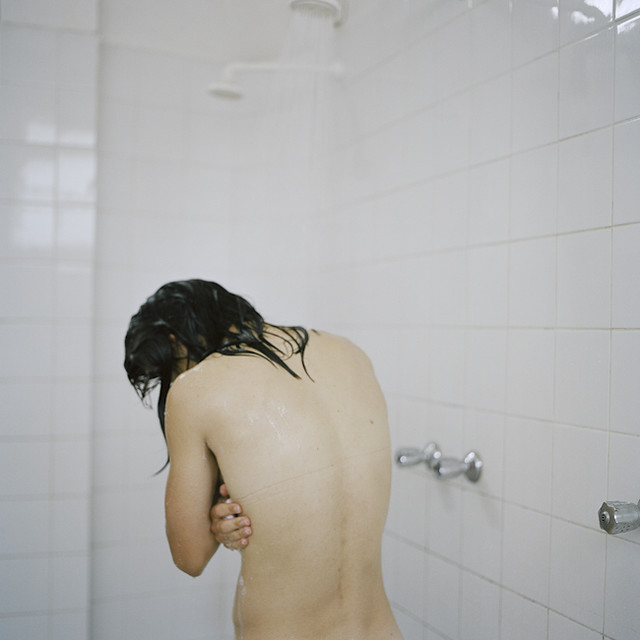
ADRIENNE:
This image is part of a series that I am working on about professional female footballers (soccer players) in Brazil. The series is titled “Guerreiras” which means “female warriors” in Portuguese. In short, the project seeks to highlight how women’s football in Brazil is gradually starting to move from the margins towards the mainstream of Brazilian culture and the tensions that accompany these shifts. Specifically we hope to question the implications of gender equality, athletic femininities, regulation of bodies, empowerment and change.
To offer up some background about women’s football in Brazil, women were actually legally prohibited from playing the game until 1981. Many people around the world often consider Brazil the 'nation of football,' but what most do not realize is that this label tends to refer solely to the men's game. For many years, women playing football in Brazil were considered a disgrace to the game and many players struggled to gain acceptance amidst a lack of support and cultural disapproval. So in turn, the same machismo responsible for the legal prohibition in Brazil's past is now also responsible for the cultural prejudices against female players that still exist today.
For several months last year, I went down to Brazil with my friend and former teammate, Caitlin Fisher, to begin working on this project. Caitlin, a gender researcher and former professional player, really sparked the idea for me when, one night several years back (after probably what was a few too many beers), she told me about her crazy experience as a professional player in Brazil. I was completely taken by the stories that she shared about women’s football in Brazil. And as a player myself, it was truly inconceivable for me that women could face such scrutiny for just wanting to play a sport that they loved.
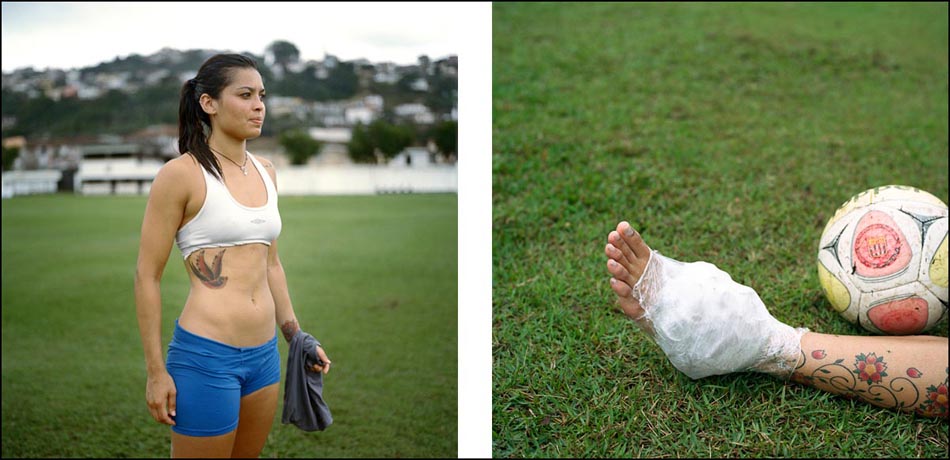
A year or two later, I reached out to Caitlin to tell her that I felt compelled go down to Brazil to photograph this story. She was completely on board and it seemed like the perfect time for us both to take this on. Thankfully, given Caitlin's past life as a professional player in Brazil, she was able to reach out to Kleiton Lima, the head coach of Santos FC (and the Brazilian Women’s National team), to organize full access for me to live with and photograph his team.
TID:
Can you describe what was going on in your mind as the image took shape, and then also what you were thinking when you made the image?
ADRIENNE:
This image was taken in the locker room after the Santos women won yet another major tournament in Brazil - the Campeonato Paulista. It's one of my favorite images from the work so far, so I'm really glad you asked about it.
I remember heading into the locker room after the match and watching in delight as the girls started dancing, singing and celebrating their win in typical Brazilian style. As all the craziness was going on, I saw two of the players head off toward the showers and instinct told me to follow them in. I remember walking in with my camera and motioning towards one of the players that I was going to take some photographs. After she nodded that it was okay, I took a few frames and then kind of hung back, waiting for her to forget that I was there. As I turned around to see what else was going on, there unfolded this moment. It was such a beautiful and tender moment - one of those that I think everyone can relate to. The player, Gaucha, was just standing there, under the water, completely lost in herself. Just the way her hand was gently holding her side and how her head was bowed under the water seemed so elegant, especially after she had just played such an intense match. I quickly re-focused my camera and got one shot off before she turned to see what I was doing. So just as quick as the moment arrived, it was lost. But I went home that night with that crazy good feeling when you think you've make a good frame.
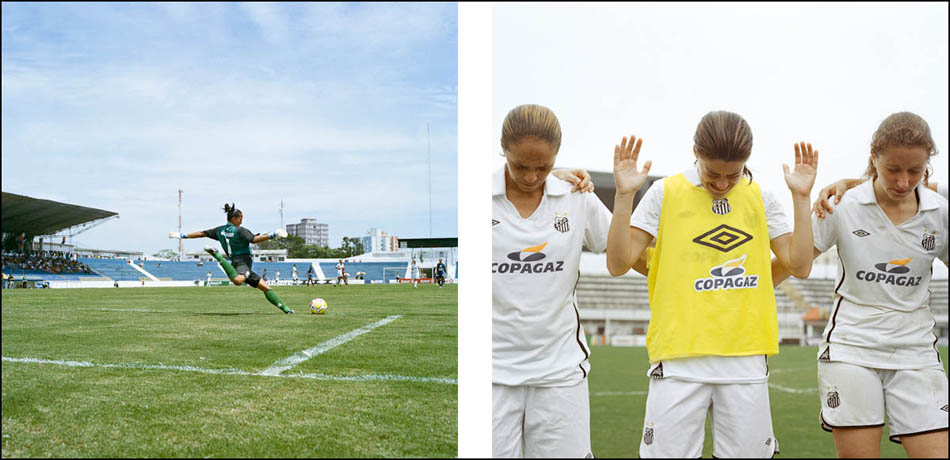
TID:
You mention instinct, but I am also wondering if by spending so much time around the players as they went through the routines of practice and games, if you saw and planned on making photos of recurrent behavior or actions? Were there patterns and repetitions you saw that you helped you make photographs, and was this shower photo a result of any of these?
ADRIENNE:
For sure. I was living and breathing football with these women, day in and day out, so I was always rethinking, reshooting and reworking what I was seeing. Every night I would go home and log all of the situations that occurred and important photographs that I had taken. This was not only for captioning reasons, but also to keep track of what I still needed. I was constantly reviewing my shot list and it was an ongoing and ever changing process. The “shower shot” was one of those that had lingered for a while. As a former player, the shower was always a place where crazy moments unfolded, so I had wanted to capture that in some way. This frame was from the only time that I stepped into the shower with the girls, so in the end, no matter how much planning went into it, a little bit of luck and timing went a long way.
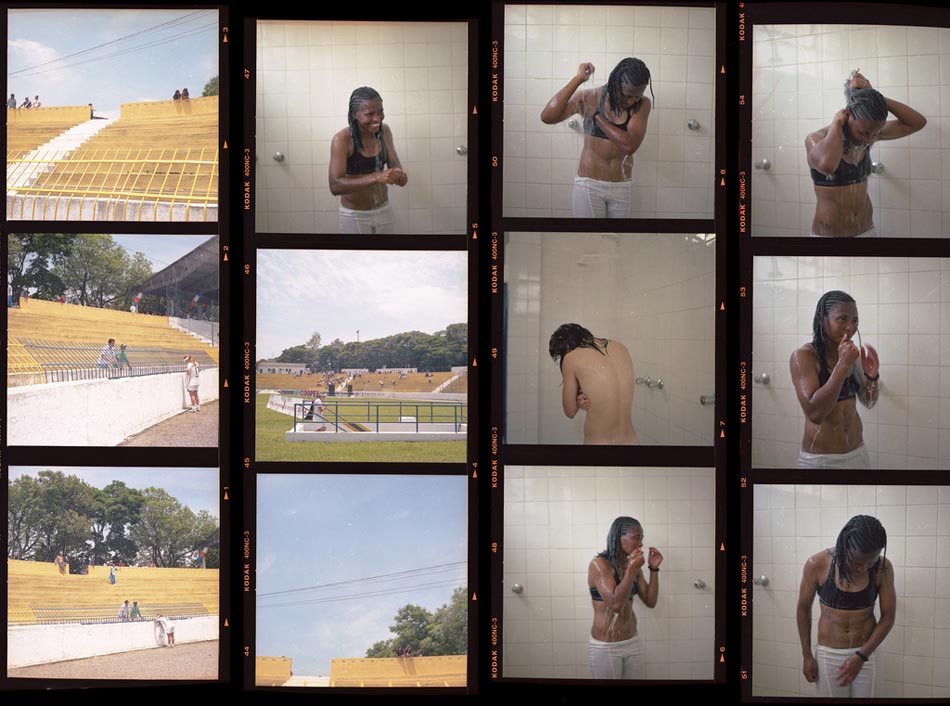
TID:
What were some problems or challenges you encountered during the coverage of this event, and how did you handle them?
ADRIENNE:
Well to be honest, Brazil, in its entirety, was one great challenge for me. But a great challenge in the sense that it forced me to work outside of my comfort zone, pushing my mind and photo self to the edge and back.
First of all, I went down to Brazil without knowing any Portuguese. I moved into an apartment with a younger player on the team - she was 19 and did not speak English - and our interaction was a comedy of errors for the most part. In fact, no one in Santos really spoke English, so day in and day out, I was forced to think and move as a photographer without being able to easily communicate with my subjects – something that was completely new to me.
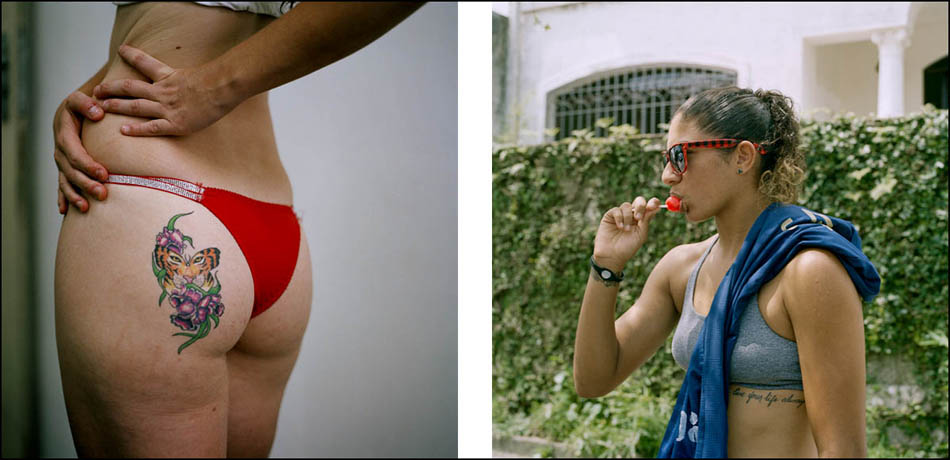
TID:
I’ve heard stories from some photographers who said working where they did not speak the language actually helped them – they felt it allowed them to blend in more to the background since they and their subjects couldn’t engage verbally. The photographers felt they were less of a distraction. I’ve heard others say the lack of language made working nearly impossible. How did you feel, and how did you make it work?
ADRIENNE:
It was a bit of both. At first, it really jolted me. I felt thrown into these women’s lives and a bit lost in it all. When they asked me questions about myself, my photography, my life, I did not have the answers in Portuguese. In the past, my access was often built on my ability to chat with my subjects and make them feel comfortable with my presence. This experience forced me to figure out ways around that. And as soon as I was able to get past the strangeness of it all and the “mental meditations” that occur when you are not able to speak the language, I realized that it allowed me to blend into the background and be less of a distraction when I picked up my camera. In the end, I think it all worked out. But you can be sure that I’ve been practicing Portuguese for my return in a few months.
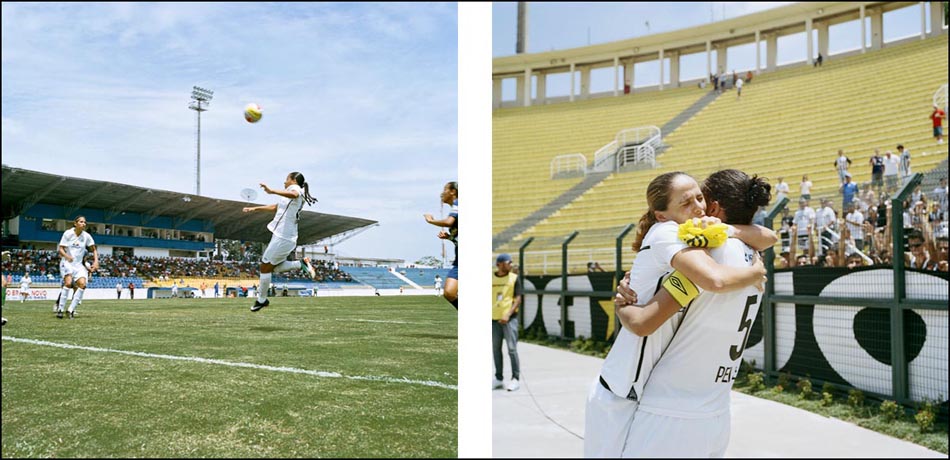
Also, safety was often a concern in Brazil. Since I was there on a shoestring budget and not on assignment, I didn’t have the luxury of any special security or fixer situation. I was often worried that I could get robbed of my equipment, so I usually carried my camera gear in a soccer bag and tried to look like I was just one of the players headed to practice.
Another challenge was that I worked for two months straight without ever seeing a frame that I had taken. Given that I was down in Brazil with only 9o plus rolls of 120 film, I was constantly rethinking the work in my mind, questioning why I was down there and trying to imagine all that I would need to capture (within my limited film budget) to tell the story. It was an incredibly humbling and exciting experience.
TID:
Did you choose to work this way? Was it more of a budgetary decision, or an approach that you choose as a strategy?
ADRIENNE:
I finished the ICP full-time program the summer before I went down, which meant that I had wasted just about all of my savings. So in order to get down to Brazil, I sold a bunch of furniture from my apartment and pulled together what was left in my bank account. I bought all the film that I could afford at the time and my friend Ying Ang also hooked me up with an extra 20 rolls, which made a huge difference. At first when I got to Brazil I was looking for some good places to process film, but I soon realized that shipping my film around Brazil to labs was not ideal. So I just came to terms with the fact that I would not have the option of seeing what I shot. I had to trust myself a bit to know that there was something there. And I prayed a lot to the photo gods when I finally dropped off the rolls for processing in New York.
TID:
Can you talk more about your questioning? Was this something you wrote down, conversations with the writer? Other photographers?
ADRIENNE:
My friend Caitlin and I had conversations almost every night. She came from the land of academia and often had an entirely different perspective than my own, but we both shared the commonality of being female football players. Together we often worked all hours of the night, discussing the project, questioning what we had witnessed, areas for development, etc. I have an entire notebook full of ideas and thoughts that were discussed during those nights. It was an incredible experience to be able to share my ideas with someone else outside of the photography world and I believe the project is stronger because of it.
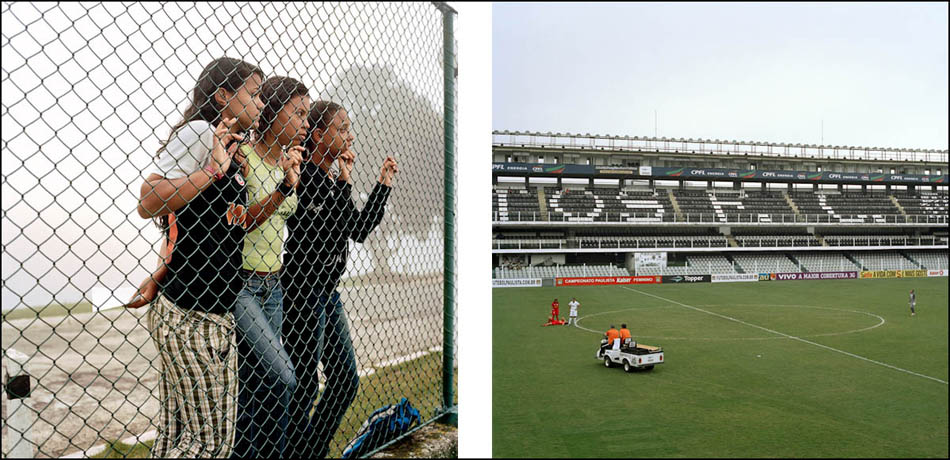
One of the most crucial struggles has been the incredible responsibility I feel to these women to tell their story with honesty and grace. Brazil is a crazy country, with many layers and complications, and this story is no exception. Over the years, many of these women have struggled to pursue their passion for football, often leading a life that their families and friends do not support. Through it all, they demonstrated an unwavering perseverance despite the fact that their femininity and sexual orientation was regularly called into question. What I realized while I was down there is that these women are strong, independent and assertive and they are proof that masculinity is not a prerequisite for success. In a time when Brazil is changing on so many fronts, these women are juggling gender roles and creating a space of their own in one of the last machismo realms – the football pitch. I was in awe of their talent and “jeito” (way) every day that I was down there and I feel indebted to them for allowing me the opportunity to document their lives.
TID:
Was there anything that you learned or put to use in later assignments that come about from this experience?
ADRIENNE:
Well yes, there is always so much to be learned from every assignment; in fact, I believe that there is a lesson to be learned in everything we do. Such is life. Specifically from this project though, one of the most rewarding and worthwhile experiences has been, and continues to be, my collaboration with Caitlin Fisher. As photographers, we often live very solitary lives, especially when working on personal projects, so it was a first for me to allow someone to live so closely to that world. My experience with Caitlin in Brazil was electric – many late nights, conversations, thoughts, disagreements, agreements, laughter, etc. Together our dialogue helped shape the work into what it is today, and has elevated my focus and direction for how I hope the project will continue to grow when I head back there this winter.
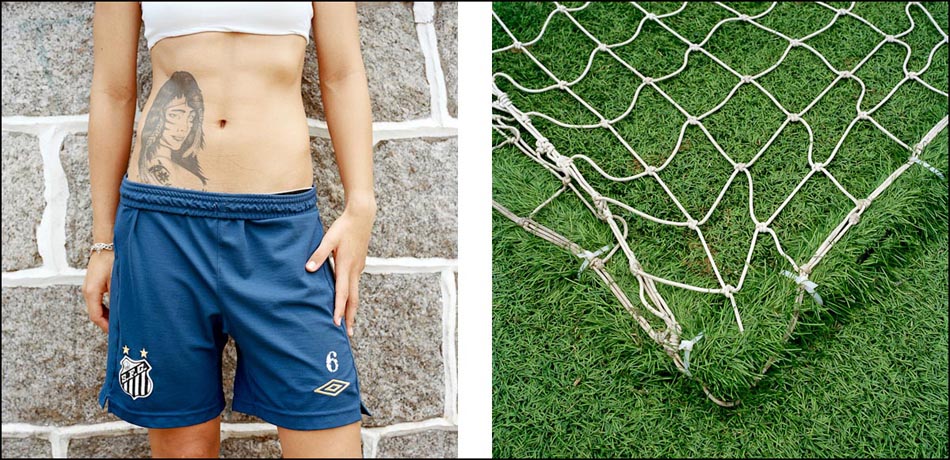
TID:
What is your goal for this winter’s trip? Do you have the same or different direction now that you have been able to come back, process, and edit the images you made last time? Are you going to continue to shot film, but not look at it until you get back?
ADRIENNE:
Yes, new direction, thoughts, plans, ideas – definitely. Now that I’ve had some time to come up for air, I am more focused and ready to work when I return. When I went to Brazil the first time, I was not prepared for what I was going to see – everything was a new experience and I was still working to understand what my story was about. Since then, Caitlin and I have presented and lectured about the work in several different venues and we have definitely planned for how we would like the project to progress. During my first trip, I decided it would be best to focus on the one team - Santos FC. But when we return, we will be traveling the country, visiting several different women and professional teams with the goal of documenting all of the professional women’s football teams in Brazil. I will continue to use 6x6 color film and will not process it while I am in Brazil. I liked the experience of shooting without seeing and think it is a needed restriction for this project.
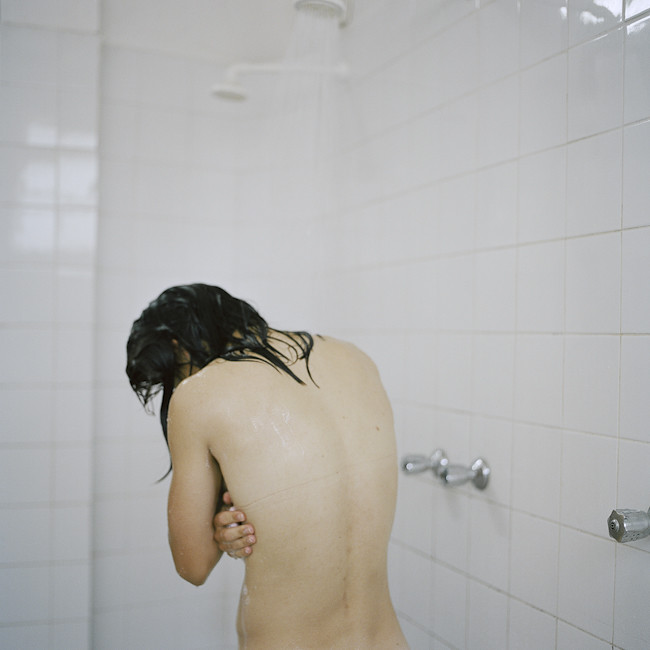
+++
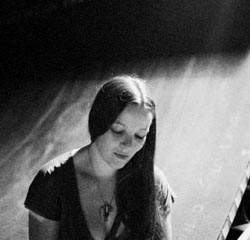
You can view her work here:
www.adriennegrunwald.com
http://guerreirasproject.wordpress.com/
Next week we will take a look behind the story
of this iconic image from 9/11 by Thomas Franklin:
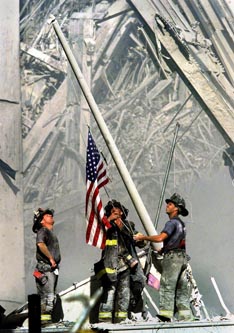
If you have any suggestions, or if you want to interview a
photographer for the blog, contact Ross Taylor or Logan Mock-Bunting: